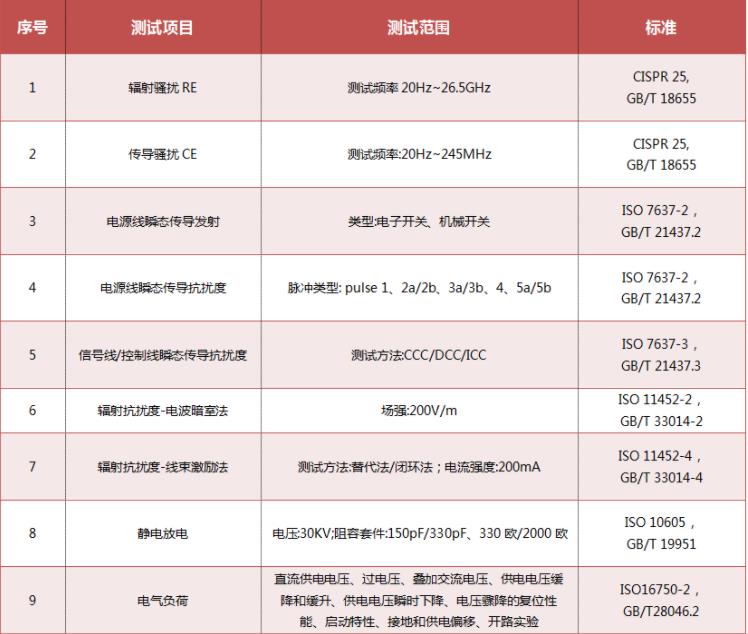Automotive Electronics EMC Testing
With the continuous advancement of electromagnetic compatibility technology in China, the confined space of a vehicle now houses numerous electronic devices. These include integrated systems such as navigation units, car audio systems, reversing radars, and airbag systems. Each of these electronic devices has the potential to emit interference signals across different frequency bands into the surrounding environment. For instance, when driving beneath high-voltage power lines, interference affecting the vehicle's electronic control circuits may render operations ineffective. At best, this compromises the driving experience; at worst, it can lead to catastrophic accidents involving vehicle destruction and loss of life. Consequently, automotive electronics testing plays an increasingly vital role in ensuring road safety. MicroTest's Automotive Electronics Laboratory possesses comprehensive testing facilities and equipment, supported by a dedicated technical team to safeguard your products and deliver professional, reliable testing services.
Introduction to Automotive Electronics EMC Testing:
Electromagnetic Compatibility (EMC) refers to the ability of equipment or systems to function correctly within their electromagnetic environment without causing unacceptable electromagnetic disturbance to any entity within that environment. Consequently, EMC encompasses two requirements: firstly, the electromagnetic interference (EMI) generated by equipment during normal operation must not exceed specified limits; secondly, equipment must possess a certain degree of immunity to electromagnetic interference (EMS) present in its environment. In summary, EMC = EMI + EMS.
Limiting external interference from vehicles to protect onboard radio equipment and other sensitive devices;
Ensuring a vehicle's electromagnetic susceptibility enables normal operation in harsh electromagnetic environments.
Blue Asia Testing's automotive electronics testing projects, scope, and standards:

Blue Asia Technology's Automotive Electronics EMC Testing Advantages:
1. Advanced Testing Instrumentation
Blue Asia operates a specialised ‘Automotive Electronics EMC Testing Laboratory’ platform. Equipment is sourced from international brands including R&S, Schwarzbeck, Agilent, Schloder, 3Ctest, Tektronix, and micotop.
For further details, please contact Blueya Technology. With the continuous advancement of electromagnetic compatibility (EMC) technology in China, the confined space of a vehicle now integrates numerous electronic devices. These include electronic systems such as navigation units, car audio systems, reversing radars, and airbag systems. Each of these electronic devices has the potential to emit interference signals across different frequency bands into the surrounding environment.
Electromagnetic Compatibility (EMC) refers to the ability of equipment or systems to function correctly within their electromagnetic environment without causing unacceptable electromagnetic disturbance to any entity within that environment. Consequently, EMC encompasses two requirements: firstly, the electromagnetic interference (EMI) generated by equipment during normal operation must not exceed specified limits; secondly, equipment must possess a certain degree of immunity to electromagnetic interference (EMS) present in its environment. In summary, EMC = EMI + EMS.
2. Limiting external interference from the vehicle to protect onboard radio equipment and other sensitive devices;
3. Ensuring the vehicle's electromagnetic immunity enables normal operation in harsh electromagnetic environments.
Blue Asia Testing Automotive Electronics Testing Projects, Scope and Standards
Contact: Benson
Mobile: (+86) 136 3250 0972
Email: marketing@cblueasia.com
